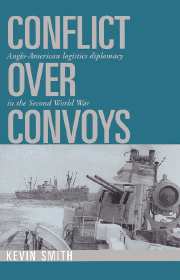Book contents
- Frontmatter
- Contents
- List of maps
- List of tables
- Preface
- List of abbreviations and codewords
- Introduction
- 1 “Not what it could or should be”: Britain's shipping situation
- 2 “Beyond our power without your help”: Britain's Battle of the Atlantic
- 3 “But westward, look, the land is bright”: American shipping assistance from neutrality to belligerency, March 1941–November 1942
- 4 Roosevelt's promise: “your requirements will be met”
- 5 The Casablanca Conference and its aftermath: a “most curious misunderstanding”
- 6 Reaping the whirlwind: the perils of impending victory
- Postscript and conclusions
- Appendices
- 1 Measuring merchant ship tonnage
- 2 The plight of British shipbuilding
- 3 Roosevelt's letter to Churchill, 30 November 1942
- 4 Behrens' interpretation of Roosevelt's letter
- 5 Text of SABWA 156, the CSAB (W) cable of 19 January 1943 which relayed the WSA's interpretation of Roosevelt's promise
- 6 Roosevelt's letter to Churchill, 28 May 1943
- Tables
- Notes
- Bibliography
- Index
4 - Behrens' interpretation of Roosevelt's letter
Published online by Cambridge University Press: 06 July 2010
- Frontmatter
- Contents
- List of maps
- List of tables
- Preface
- List of abbreviations and codewords
- Introduction
- 1 “Not what it could or should be”: Britain's shipping situation
- 2 “Beyond our power without your help”: Britain's Battle of the Atlantic
- 3 “But westward, look, the land is bright”: American shipping assistance from neutrality to belligerency, March 1941–November 1942
- 4 Roosevelt's promise: “your requirements will be met”
- 5 The Casablanca Conference and its aftermath: a “most curious misunderstanding”
- 6 Reaping the whirlwind: the perils of impending victory
- Postscript and conclusions
- Appendices
- 1 Measuring merchant ship tonnage
- 2 The plight of British shipbuilding
- 3 Roosevelt's letter to Churchill, 30 November 1942
- 4 Behrens' interpretation of Roosevelt's letter
- 5 Text of SABWA 156, the CSAB (W) cable of 19 January 1943 which relayed the WSA's interpretation of Roosevelt's promise
- 6 Roosevelt's letter to Churchill, 28 May 1943
- Tables
- Notes
- Bibliography
- Index
Summary
Behrens cites a memorandum by Cherwell of 12 February 1943 in the Churchill Papers (PREM 3) as the source of British complaints about Roosevelt's letter that improperly endow Roosevelt with partial responsibility for the Indian famine of 1943. He supposedly “hedged the promise round with a variety of qualifications.” British officials “discovered eight separate qualifications almost every one of which might render the promise valueless”: a “quite intolerable” situation which “left the British Government with only one practicable possibility—to cut the Indian Ocean sailings.” I could not find a 12 February memorandum, but Cherwell's memorandum of 9 March 1943 (WP [43] 100) dealing with the same subject may be the (revised) source. In either case, the memorandum cannot refer directly to Roosevelt's promise of 30 November 1942. There are not eight qualifications in that letter. In a WSA cable of 19 January 1943 (SABWA 156: see Appendix 5) describing projected WSA implementation of Roosevelt's letter, there are seven qualifications in paragraphs two to eight. Cherwell wrote on 9 March: “Recently we received from the War Shipping Administration their interpretation of the President's promise. It was hedged in by no less than eight provisos.” Behrens accepted Cherwell's miscounting, but applied it incorrectly. Cherwell continued: “In order to escape from our immediate dilemma it has been decided that not more than 40 ships instead of 90 a month can be sent to the Indian Ocean theatres.”
- Type
- Chapter
- Information
- Conflict over ConvoysAnglo-American Logistics Diplomacy in the Second World War, pp. 244 - 245Publisher: Cambridge University PressPrint publication year: 1996



